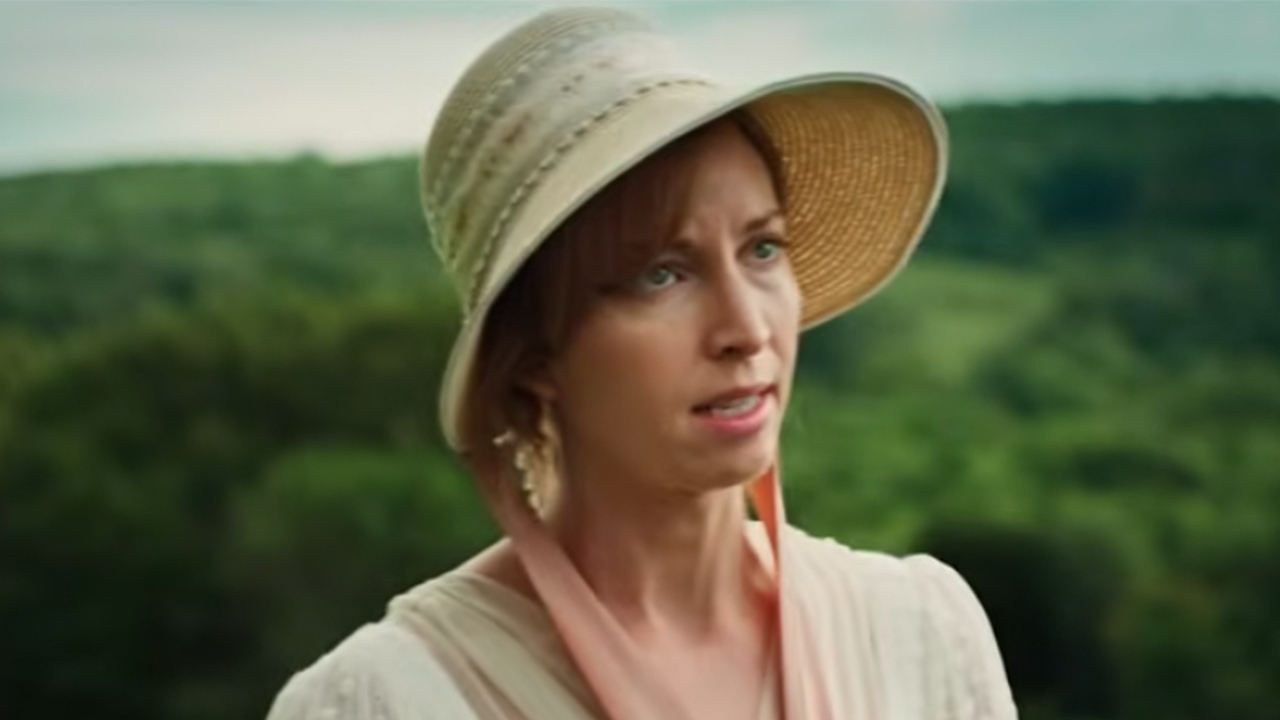Exclusive Interview: Drive Angry Director Patrick Lussier And Writer Todd Farmer
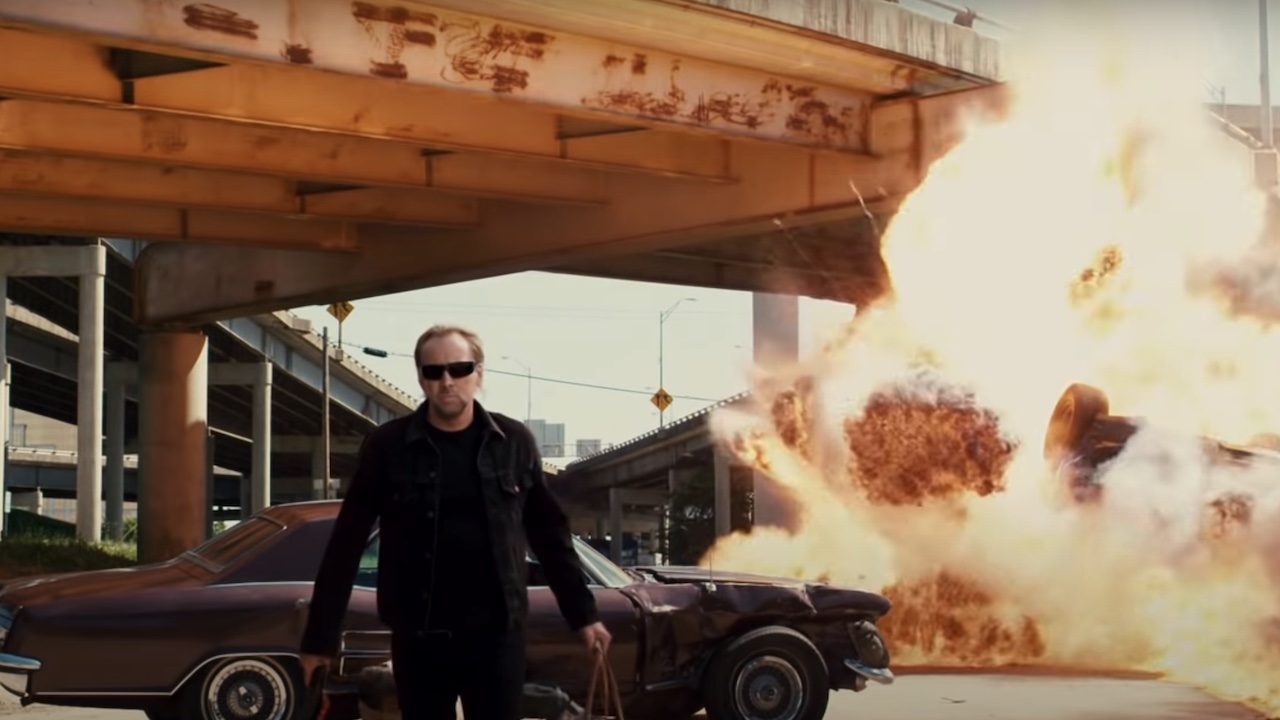
Your Daily Blend of Entertainment News
You are now subscribed
Your newsletter sign-up was successful
Watching the trailer for Drive Angry 3D, it’s pretty easy to figure out exactly what you’re going to get. On a weekend that celebrates all of the glitz and glamour of Hollywood, it’s merely a chance to watch Nicolas Cage blow shit up and kill people while Amber Heard puts on some very small Daisy Dukes and rides around in a ’69 Dodge Charger. And that’s exactly how director/co-writer Patrick Lussier and co-writer Todd Farmer intended it.
Just yesterday I sat down with the filmmaking pair to discuss their new film and while a fire alarm went off right in the middle of our interview, we had a great little chat about their tribute to 70s road movies, Nicolas Cage’s hair, and how Todd found himself getting beaten to a pulp. Check it out below.
Thanks to My Bloody Valentine 3D and now this movie, you two have established yourself at the front of the 3D movement.
Patrick Lussier: Did you talk to Jim Cameron about that? [laughs]
Todd Farmer: He might not agree with you [laughs]. “Those guys just throw shit in your face!”
Just looking at the poster where it says “Shot in 3D,” it seems like the difference between made in 3D and post conversion is finally being recognized. Can you guys weigh in on that?
Patrick Lussier: We had actually pushed for them to put that on the poster. We talked to Tim Sommerfeld at Summit saying that we should include that “Shot in 3D.” I think it was after Clash of the Titans or something like that that came out in the summer that had a post-conversion, and that was really important. There’s a real difference between a movie that is shot in 3D, conceived in 3D as opposed to smearing the 3D on later because you think it might make more money.
Your Daily Blend of Entertainment News
Todd Farmer: Well it was interesting. We did Valentine, it was fairly successful, and some people thought it was more a gimmick – that it was a fluke that it was successful. But yet everybody started doing 3D movies and then a lot of them started post-converting, which was not what we did and it showed.
When you were making this film was every single shot in 3D?
Patrick Lussier: Yeah. Everything was shot with 3D, we only shot with 3D cameras. It was all stereo.
I’ve actually been following this film ever since it was announced and one thing that I found interesting was that the supernatural element, that Nicolas Cage had escaped from Hell in order to rescue his granddaughter, wasn’t revealed until the first footage was shown at last year’s Comic Con. Was that done on purpose, was it knowingly kept under wraps, or was it something that simply wasn’t picked up by the trades?
Todd Farmer: We wrote it under wraps.
Patrick Lussier: We wrote it to be revealed gradually throughout the story and then it became something that they wanted to focus on more, probably even after Comic Con. As they started seeing the film they realized it was such a key element to the story, they were like, “Sell that element! That’s such a great element!” And it was something they wanted more of in terms of the marketing of the film. So the conception was that they didn’t discover that background of hell or anything like that until Amber [Heard]’s character discovers it. And then because everybody involved had such a great time with those components they wanted to make that something we introduced earlier.
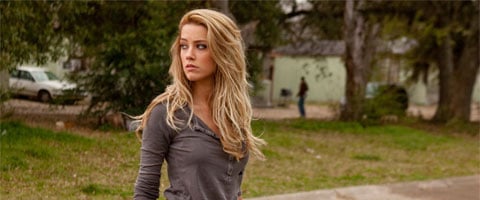
Todd, I wanted to ask you about the role that you play in the film, which is a fairly small part, but also pretty awesome. In less than ten minutes of screen time you get a sex scene, a fight scene and a death scene. When you were writing the script was that all planned with you playing that part?
Todd Farmer: It was because we did something similar in Valentine and we figured it would be funny if we did it again. But it ended up being a very interesting role because he’s the way he is it sends Piper on her journey. And, at the same time, it allows when The Accountant comes in and finally dispatches someone the Frank character has to be such a dick that you don’t hate The Accountant for dispatching him. So it was a lot of fun because everyone gets to kick my ass and that’s fun.
Obviously it wasn’t real, but did you have any hesitation about punching Amber?
Todd Farmer: Oh no, I liked it [laughs]. Amber and I, even on our days off sometimes we’d just hook up and just [throws a fake punch].
You could definitely feel the turn in the audience during that scene when that happens.
Patrick Lussier: I think when you actually had to hit Amber I think that was a little stressful for you.
Todd Farmer: Uh, it’s possible.
Patrick Lussier: But when Amber had to hit Todd…
Todd Farmer: Yeah, she didn’t have a problem with that [laughs].
Patrick Lussier: Todd had Amber paw prints on his chest. And you’d look at it, you’d come up afterwards and you see this perfect Amber hand print
Todd Farmer: And then there’s the scene when I’m being thrown into the wall. And they were throwing me over and over, and they were throwing me slow, which it didn’t look right. So I was like, “Just throw me fast.” “No, no, we don’t want to hurt you.” So, in the end, they threw me like eleven times and then finally threw me fast the last time and it was great, but by then I was a bloody pulp [laughs].
Patrick Lussier: But yeah, other than that Todd survived unscathed.
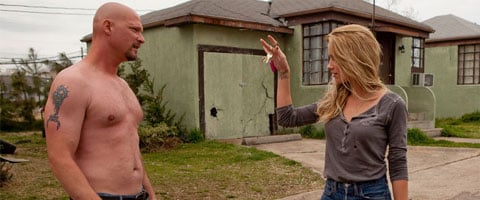
On that same note, there was a lot of fighting in this movie and there was also a lot of driving stunts. What was the training process like for the actors?
Patrick Lussier: You know, a lot of it was getting used to the cars, the specific cars that they were driving. Nic is an amazing driver, he’s so skilled behind the wheel. He knows exactly what a car can do, how fast to push it, he’s incredibly safe and conscientious and takes great care with all the other actors and everyone involved. Having Piper on the hood of the Charger as he’s driving along, free driving, behind the RV and having to reach up and grab her and pull her through the window.
One thing that I love about Nicolas Cage movies is that with every film he seems to be sporting a different hairstyle and that holds true for this movie as well. Was that part of the character’s look a collaborative process or was that something that he brought to the table?
Patrick Lussier: We had talked a little bit about hairstyles for Nic and he came up with this. And he came up and said, “What about if I do this?” and we loved the look of it and the fact that it had a similarity to Amber so that father-daughter echo could be really clear.
This film is definitely steeped in the tradition of road movies from the 1960s and 1970s. Were there any specific titles that you were particularly influenced by?
Patrick Lussier: Yeah, the specific inspirations were definitely Vanishing Point, Duel, Dirty Mary Crazy Larry, Race With The Devil, High Plains Drifter was a huge inspiration.
Todd Farmer: The version with the cars [laughs].
Patrick Lussier: Those were some of the key things. Obviously Groundhog Day, without hesitation. Other films, we talked a lot about The Terminator, which is not a 70s movie, The Road Warrior, same, not a 70s movie – movies that had these great metal-on-metal sequences in it.
I talked to George Tillman Jr. who directed the movie Faster last year and he told me that sometimes in movies like this there’s a clause in the contract where the director can keep one of the cars used on set. Did you strike any kind of deal like that?
Patrick Lussier: No, that was never going to happen on this movie [laughs]. We should have had six of each – six Chargers, six Chevelles – and we had three of each. And we were lucky to keep those cars running any given day. I think we had one mechanic for all the cars.
Todd Farmer: In fact, the stunt coordinator kept trying to get you behind the wheel of one of the cars and you kept saying no. He couldn’t understand, “Why wouldn’t he do it?” But it’s interesting because the reason he doesn’t do it is because if he wrecks a car or gets hurt…[laughs]
Patrick Lussier: Yeah, you can’t do that because our assets were so limited that we had to protect them to the best of our ability.
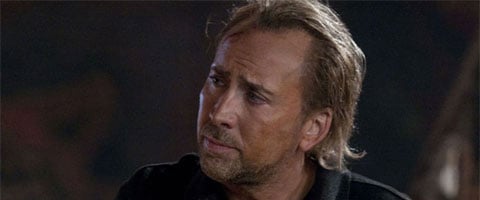
The cars you use in this movie are absolutely beautiful machines, and I don’t know how into cars you guys are, but did you ever feel a twinge of guilt about destroying them like you did?
Patrick Lussier: Never, never felt any guilt.
Todd Farmer: I didn’t feel guilt, but when we were told that there’s a limited number of Chargers left because of what Dukes of Hazzard did...
Patrick Lussier: Yeah, Dukes of Hazzard destroyed some of the Chargers. We never destroyed the Chargers. The Chargers went through a lot, but it was cosmetic. The Chevelle, on the other hand…one Chevelle is pristine, one Chevelle is uhh, not in good shape. The one we probably felt the most guilt about was the Riviera. The ’64 Riviera is a beautiful, beautiful, beautiful car.
Is there a chance we might see a sequel to this?
Todd Farmer: There’s a good chance we have a sequel figured out in our heads.
I’ve read that you have three projects on the horizon, Halloween 3D, Condition Dead and the Hellraiser remake. Do you know which one is next for you?
Patrick Lussier: Don’t know what’s next. Hellraiser is probably the most likely of that. It certainly has the attention of the grown-ups right now. At the end of the day it’s really what they’re willing to pay for at any given moment. At the moment they’re indulging the creation of the story and what the story might be and how the story could work. So that, at the moment, seems to be pushing ahead. Halloween, if somebody said, “Shoot it tomorrow,” we could shoot it tomorrow, but that’s up to them.
The script is all done for that one?
Patrick Lussier: Yeah, yeah. Script’s done. Like I said, and, again, we could shoot tomorrow. There’s also, given what that is, is the window sort of closed for that? It’s all up to the people that are way above our pay grade [laughs].
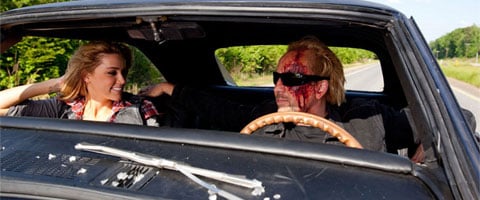
To speak honestly, there is some concern from fans of the original Clive Barker film about the Hellraiser remake. Given the opportunity what would you say to perhaps quell that anxiety?
Patrick Lussier: I think the biggest thing is, and we talked about this a lot recently, is that we have no intention of remaking Clive’s movie. Clive’s movie is obviously not like remaking My Bloody Valentine, or Happy Birthday To Me, or Terror Train or Prom Night – those are all very specific movies at a specific time with a specific purpose. As fun as they are, and that’s not to take away from them, they were clearly business ventures. Hellraiser, obviously, was not. It was a personal story for Clive and Clive is a true artist. It didn’t feel right to us to retell Clive’s story. That’s Clive’s story. At the same time, there have been a variety of Hellraiser movies and movies that play within the world that he created. And none of them have really gone behind the curtain of what that world is. So that was basically what we offered up to Dimension Films as something unique and different that stays true to Clive’s originality, but, at the same time, pays no disrespect to it.
Is there still going to be place for Pinhead and the cenobites?
Patrick Lussier: Ummmmmm…yes.
You sound a bit hesitant there.
Patrick Lussier: Not hesitant.
Todd Farmer: Some things we just want to keep as a surprise.
Patrick Lussier: It’s more exciting if you get to see it when you see it as opposed to hearing all about it in advance.
Obviously I understand that you want to keep it secret, but without giving too much away have you started the character design yet?
Patrick Lussier: Yes we have, but at the same time you wouldn’t want the advertising campaign for Empire Strikes Back to say “Darth Vader: ‘I am your father.’” You don’t want Crying Game to say she’s a dude. So we’re not going to tell you everything you want to know just yet [laughs].

Eric Eisenberg is the Assistant Managing Editor at CinemaBlend. After graduating Boston University and earning a bachelor’s degree in journalism, he took a part-time job as a staff writer for CinemaBlend, and after six months was offered the opportunity to move to Los Angeles and take on a newly created West Coast Editor position. Over a decade later, he's continuing to advance his interests and expertise. In addition to conducting filmmaker interviews and contributing to the news and feature content of the site, Eric also oversees the Movie Reviews section, writes the the weekend box office report (published Sundays), and is the site's resident Stephen King expert. He has two King-related columns.
